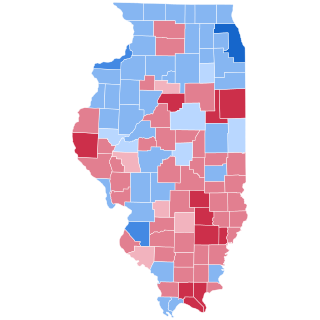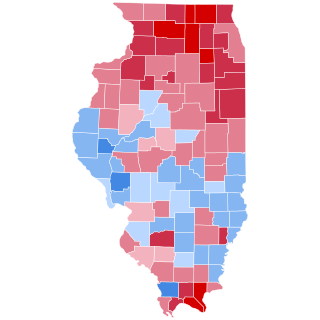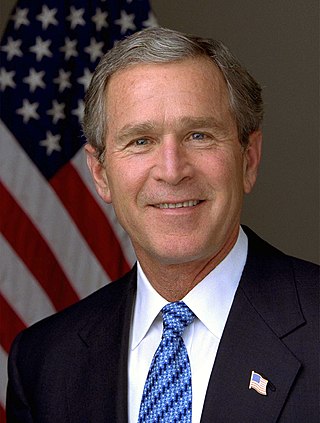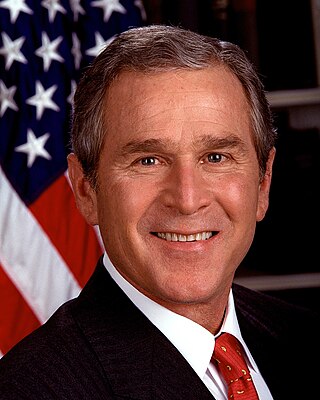
Each of the 50 U.S. states, the District of Columbia, and territories of the United States holds either primary elections or caucuses to help nominate individual candidates for president of the United States. This process is designed to choose the candidates that will represent their political parties in the general election.

The 2004 United States presidential election in Illinois took place on November 2, 2004, and was part of the 2004 United States presidential election. Voters chose 21 representatives, or electors to the Electoral College, who voted for president and vice president.

From January 3 to June 3, 2008, voters of the Republican Party chose their nominee for president in the 2008 United States presidential election. Senator John McCain of Arizona was selected as the nominee through a series of primary elections and caucuses culminating in the 2008 Republican National Convention held from Monday, September 1, through Thursday, September 4, 2008, in Saint Paul, Minnesota. President George W. Bush was ineligible to be elected to a third term due to the term limits established by the 22nd Amendment.
This article contains the results of the 2008 Republican presidential primaries and caucuses.

This is the electoral history of Barack Obama. Obama served as the 44th president of the United States (2009–2017) and as a United States senator from Illinois (2005–2008).

Voters of the Republican Party elected state delegations to the 2012 Republican National Convention in presidential primaries. The national convention then selected its nominee to run for President of the United States in the 2012 presidential election. There were 2,286 delegates chosen, and a candidate needed to accumulate 1,144 delegate votes at the convention to win the nomination. The caucuses allocated delegates to the respective state delegations to the national convention, but the actual election of the delegates were, many times, at a later date. Delegates were elected in different ways that vary from state to state. They could be elected at local conventions, selected from slates submitted by the candidates, selected at committee meetings, or elected directly at the caucuses and primaries.

The 2008 United States presidential election in Illinois took place on November 4, 2008, and was part of the 2008 United States presidential election. Voters chose 21 representatives, or electors to the Electoral College, who voted for president and vice president.

In 2008, Virginia, for the first time since 1964, cast its electoral college presidential votes for a Democrat, Barack Obama. It also elected a United States senator, members of the United States House of Representatives, and local officers such as county board and school board members.

The 2000 United States presidential election in Illinois took place on November 7, 2000, and was part of the 2000 United States presidential election. Voters chose 22 representatives, or electors to the Electoral College, who voted for president and vice president.

The 2008 United States presidential election in New Hampshire took place on November 4, 2008, as part of the 2008 United States presidential election throughout all 50 states and the District of Columbia. Voters chose four representatives, or electors to the Electoral College, who voted for president and vice president.

Presidential primaries and caucuses of the Republican Party took place within all 50 U.S. states, the District of Columbia, and five U.S. territories between February 1 and June 7, 2016. These elections selected the 2,472 delegates that were sent to the Republican National Convention. Businessman and reality television personality Donald Trump won the Republican nomination for president of the United States.

The 1980 United States presidential election in Illinois took place on November 4, 1980. All 50 states and The District of Columbia, were part of the 1980 United States presidential election. State voters chose 26 electors to the Electoral College, who voted for president and vice president. Illinois voters chose between the Democratic ticket of incumbent president Jimmy Carter and vice president Walter Mondale, and the Republican ticket of Ronald Reagan and running mate George H. W. Bush, as well as the independent candidacy of John B. Anderson and running mate Patrick Lucey.

The 2016 United States presidential election in Illinois was held on Tuesday, November 8, 2016, as part of the 2016 United States presidential election in which all 50 states plus the District of Columbia participated. Illinois voters chose electors to represent them in the Electoral College via a popular vote, pitting the Republican Party's nominee, businessman Donald Trump, and running mate Indiana Governor Mike Pence against Democratic Party nominee, former Secretary of State Hillary Clinton, and her running mate Virginia Senator Tim Kaine. Illinois had 20 votes in the Electoral College.

The 2016 United States presidential election in Oregon was held on Tuesday, November 8, 2016, as part of the 2016 United States presidential election in which all 50 states plus the District of Columbia participated. Oregon voters chose electors to represent them in the Electoral College via a popular vote, pitting the Republican Party's nominee, businessman Donald Trump, and running mate Indiana Governor Mike Pence against Democratic Party nominee, former Secretary of State Hillary Clinton, and her running mate Virginia Senator Tim Kaine. Oregon has seven electoral votes in the Electoral College.

The 1916 United States presidential election in Illinois was held on November 7, 1916, as part of the 1916 United States presidential election. State voters chose 29 electors to the Electoral College, who voted for president and vice president.

The 2004 Illinois Republican presidential primary was held on March 16 in the U.S. state of Illinois as one of the Republican Party's state primaries ahead of the 2004 presidential election. 73 delegates to the 2004 Republican National Convention were allocated to the presidential candidates.

The 2000 South Dakota Republican presidential primary took place on June 6, 2000, as one of five final primaries on the same day in the Republican Party primaries for the 2000 presidential election. The South Dakota primary was a closed primary, with the state awarding 22 delegates to the 2000 Republican National Convention, of whom all 22 were pledged delegates allocated on the basis of the primary results.

The 2000 Texas Republican presidential primary was held on March 14, 2000, as part of the 2000 presidential primaries for the 2000 presidential election. 124 delegates to the 2000 Republican National Convention were allocated to the presidential candidates, the contest was held alongside primaries in Florida, Louisiana, Mississippi, Oklahoma and Tennessee.

The 2000 West Virginia Republican presidential primary was held on May 9, 2000, as part of the 2000 presidential primaries for the 2000 presidential election. 18 delegates to the 2000 Republican National Convention were allocated to the presidential candidates, the contest was held alongside primaries in Nebraska.





















